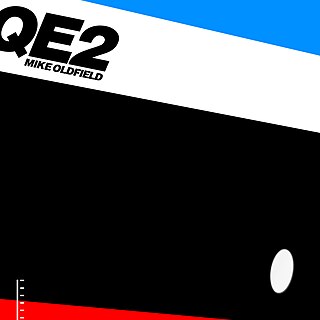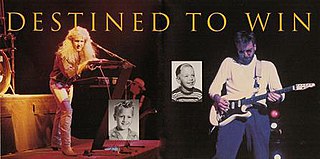Long Play , or LP, is a vinyl record format.
Long Play or Longplay or Long Player may also refer to:
Script may refer to:
LP or lp may stand for:

In music, a single is a type of release, typically a song recording of fewer tracks than an LP record or an album. One can be released for sale to the public in a variety of formats. In most cases, a single is a song that is released separately from an album, although it usually also appears on an album. In other cases a recording released as a single may not appear on an album.

A phonograph record, a vinyl record, or simply a record is an analog sound storage medium in the form of a flat disc with an inscribed, modulated spiral groove. The groove usually starts near the periphery and ends near the center of the disc. For about half a century, the discs were commonly made from shellac, with earlier records having a fine abrasive filler mixed in. Starting in the 1940s polyvinyl chloride became common, the "vinyl records" of the late 20th century.
Stars on 45 was a Dutch novelty pop act that was successful in Europe, the United States, and Australia in the early 1980s. The group later shortened its name to Stars On in the U.S., while in the United Kingdom and Ireland it was known as Starsound. The band, which consisted solely of studio session musicians under the direction of Jaap Eggermont, formerly of Golden Earring, recorded medley recordings made by recreating hit songs as faithfully as possible and joining them together with a common tempo and underlying drum track.

An album is a collection of audio recordings issued on compact disc (CD), vinyl, audio tape, or another medium such as digital distribution. Albums of recorded sound were developed in the early 20th century as individual 78 rpm records collected in a bound book resembling a photo album; this format evolved after 1948 into single vinyl long-playing (LP) records played at 33+1⁄3 rpm.
Player may refer to:
Church may refer to:
Terveet Kädet are a Finnish hardcore punk band, the first in Finland. The group was founded in Tornio in January 1980. They have had a major influence on bands from all over the world, especially in Brazil. Max Cavalera of Sepultura and Soulfly has mentioned Terveet Kädet as one of his all-time favourite bands.
God is a monotheist conception of a supreme being and principal object of faith. Gods or deities are natural or supernatural beings considered divine or sacred, depending on tradition.

QE2 is the sixth studio album by Mike Oldfield, released in 1980 on Virgin Records. The album was named after the ocean liner Queen Elizabeth 2.
Foul Play or Foul play may refer to:

DeGarmo & Key was a Christian rock band/duo formed in 1977 by Eddie DeGarmo and Dana Key. The group is notable for having the first Christian rock album nominated for a Grammy award and the first American Christian group to have a video entered into MTVs rotation. They are also noted as being among the first groups to raise the level of technical excellence to match general market releases of the time. While the group played blues based rock with a minor British progressive rock influence, they migrated to a more pop and rock style as time went on. DeGarmo played keyboards and sang background vocals, while Key played lead guitar and did the majority of the lead vocals. The other musicians at the time of formation in the late 70s were John Hamptone, David Spain, Max Richardson and Terry Moxley (drums) along with Joe Hardy and Ken Porter (bass). Later members included Tommy Cathey on bass (1982), Greg Morrow on drums as well as Tony Pilcher on rhythm and second lead guitar. Some of their more notable hits include: "Destined to Win", "Let the Whole World Sing", "Six, Six, Six", "Boycott Hell", "Every Moment" and "Casual Christian". The group is also noted for their albums Streetlight (1986), D&K (1987), and The Pledge (1989). Other musicians who have recorded or toured with DeGarmo & Key include Kenny Porter (bass), Kevin Rodell (drums), Chuck Reynolds (drums), Steve Taylor (guitar) and Mark Pogue (guitar). The group was nominated for seven Grammy Awards and five Dove Awards DeGarmo and Key disbanded in 1995.
A cocktail is a mixed drink containing alcohol.
A keep is fortified tower in a castle.

The LP is an analog sound storage medium, a phonograph record format characterized by: a speed of 33+1⁄3 rpm; a 12- or 10-inch diameter; use of the "microgroove" groove specification; and a vinyl composition disk. Introduced by Columbia in 1948, it was soon adopted as a new standard by the entire record industry. Apart from a few relatively minor refinements and the important later addition of stereophonic sound, it remained the standard format for record albums until its gradual replacement from the 1980s to the early 2000s, first by cassettes, then by compact discs, and finally by digital music distribution.
A longplay is a play-through of a video game, created with the intent of completing it as fully as possible, mainly for the purposes of nostalgia, preservation, and possibly as a walkthrough. Also, for people who are unable or unwilling to play a certain game, yet wish to know and experience its story, a longplay can be viewed simply as a long digitally animated movie. Unlike speedruns, there is no time constraint aside from those imposed by bandwidth/filesize concerns. Likewise, a longplay is distinct from a Let's Play, in that there tends to be little to no commentary on the game from the player.
Felony was an American new wave and rock band formed in Los Angeles, California, in the early 1970s by brothers Jeffrey Scott Spry, Joseph Anthony Spry, brothers Danny Sands and Steve Sands.
The Polish music charts are provided by ZPAV, the Polish Society of the Phonographic Industry.
Talk may refer to: